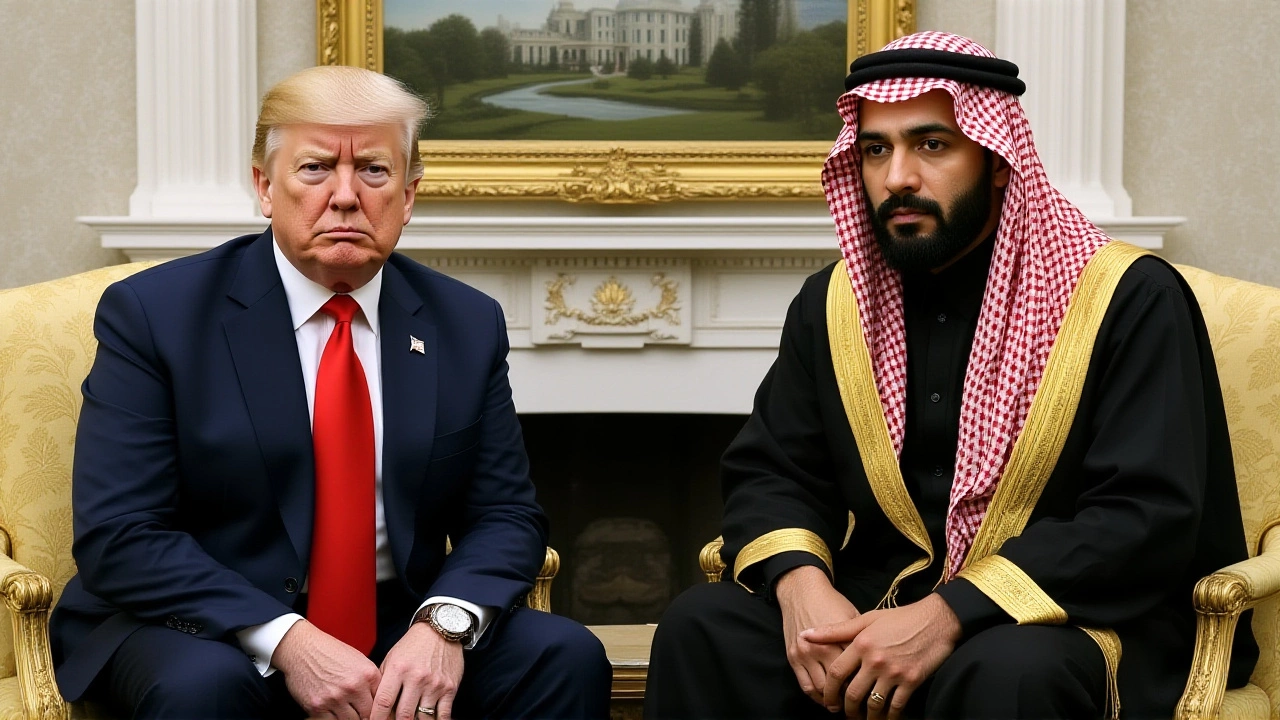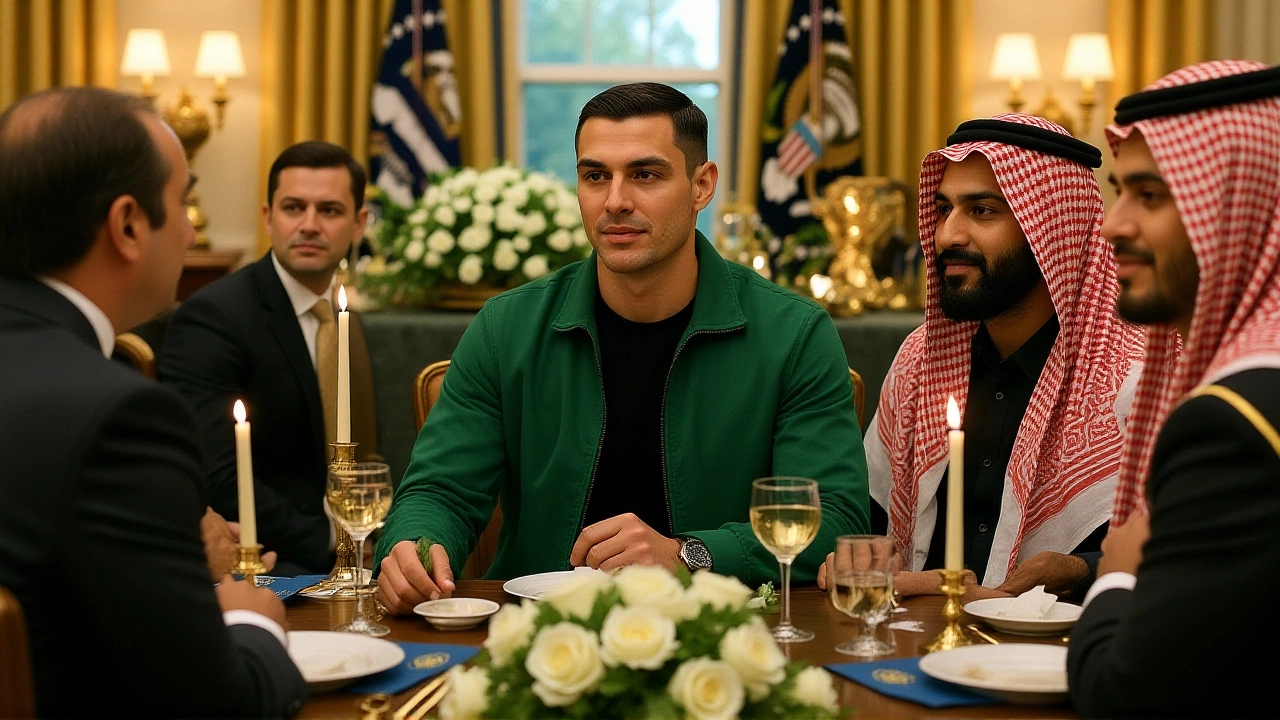It wasn’t a trophy ceremony, a Champions League final, or even a World Cup celebration — but for Cristiano Ronaldo, the moment felt just as monumental. On November 20, 2025, during a black-tie state dinner at the White House in Washington, D.C., former U.S. President Donald J. Trump personally handed the Portuguese football legend a symbolic Golden Key — a gesture steeped in tradition, meant to honor those who’ve left an indelible mark on a city or nation. Ronaldo, 40, had been invited not as an athlete, but as a global icon whose influence now stretches far beyond the pitch. The event, hosted to honor Crown Prince Mohammed bin Salman of Saudi Arabia, became an unexpected convergence of power, prestige, and pop culture — a rare moment where sports, politics, and billionaire influence collided under one roof.
A Night of Power and Prestige
The dinner, organized by First Lady Melania Trump in the East Room, drew a constellation of global elites: tech titan Elon Musk, CEOs, diplomats, and royal family members. Ronaldo sat near the front, flanked by his partner Georgina Rodriguez, his presence a quiet statement: he’s no longer just a player in the Saudi Pro League — he’s a pillar of Saudi Arabia’s broader geopolitical strategy. Trump, in his signature unscripted style, opened his remarks by praising the Crown Prince’s negotiation skills, recalling his own 2017 visit to Riyadh. "He looked at me and said, ‘One year ago, we thought your country was dead. Now you have the hottest country anywhere in the world.’" The line drew laughter — and a knowing nod from the Saudi delegation.The Golden Key and the Instagram Moment
Later that evening, in a brief, private meeting in the Oval Office, Trump presented Ronaldo with the ornate Golden Key — a ceremonial gift often bestowed upon distinguished visitors to Washington. No official record exists of who else has received it in recent years, but the symbolism was unmistakable: Ronaldo, the man who scored 135 international goals for Portugal and won five Ballon d’Or awards, had been granted symbolic access to the heart of American power. Moments after leaving the White House, Ronaldo posted a series of photos on Instagram. One showed him shaking hands with Trump, another with Musk, and a third — the viral one — featured the three of them in a selfie, grinning like old friends. His caption: "Thank you very much. Really an honor." The post, shared by over 12 million users within hours, sparked a global wave of memes and commentary. Fans dubbed it the "GOATs meeting" — a play on "Greatest of All Time," referencing both Ronaldo and Trump’s self-proclaimed status as number one in their respective fields. The convergence felt surreal: a former president, a tech billionaire, and a footballer whose career now fuels a national economic vision.
Why Ronaldo Matters to Saudi Arabia
Ronaldo’s move to Al-Nassr FC in January 2023 wasn’t just a transfer — it was a strategic play. Signed to a reported $200 million annual contract, he became the most visible face of Saudi Vision 2030, Crown Prince Mohammed bin Salman’s ambitious plan to diversify the kingdom’s economy away from oil. Al-Nassr, founded in 1955 and based in Riyadh, has since seen its global social media following explode. The club now draws international broadcast deals, sponsorship deals worth hundreds of millions, and stadium crowds that rival Europe’s biggest. Behind it all is the Public Investment Fund (PIF), Saudi Arabia’s $900 billion sovereign wealth fund, chaired by the Crown Prince himself. The PIF owns Al-Nassr and has poured billions into global sports: acquiring Premier League club Newcastle United, funding the LIV Golf tour, and investing in UFC, Formula 1, and even esports. Ronaldo’s presence isn’t just marketing — it’s nation-building. His Instagram following of 630 million people makes him the most powerful soft-power asset Saudi Arabia has ever cultivated.What This Means for U.S.-Saudi Relations
The White House dinner wasn’t just a social event — it was a diplomatic signal. Trump’s praise for the Crown Prince echoed his 2017 visit, when he signed $110 billion in arms deals with Saudi Arabia. Since then, U.S.-Saudi ties have weathered turbulence — especially after the 2018 Jamal Khashoggi murder — but under Biden and now with Trump’s return to political prominence, the relationship has quietly rekindled. Energy cooperation, defense partnerships, and now, sports diplomacy, are the new pillars. Ronaldo’s attendance — and Trump’s public admiration — sent a clear message: Saudi Arabia’s investment in global sports is not just tolerated; it’s celebrated. And for a man who once defined European football, this moment marks his full transition into the arena of international statecraft.
What Comes Next?
Rumors are already swirling that Ronaldo may be invited to speak at next year’s World Economic Forum in Davos, possibly alongside the Crown Prince. There’s talk of a joint Saudi-U.S. youth sports initiative, funded by the PIF and backed by U.S. state departments. Meanwhile, Al-Nassr’s upcoming match against Al-Hilal — the "El Clásico" of Saudi football — is being promoted as a global event, with ESPN and Sky Sports reportedly bidding for exclusive rights. And while some critics call it "sportswashing," others see something else: a new model of global influence, where athletes aren’t just endorsers — they’re ambassadors. Ronaldo didn’t just receive a key. He was handed a role.Frequently Asked Questions
Why did Donald Trump give Cristiano Ronaldo a Golden Key?
The Golden Key is a ceremonial honor traditionally given to individuals who’ve made exceptional contributions to a city or nation. Trump presented it to Ronaldo as recognition of his global influence and symbolic alignment with Saudi Arabia’s Vision 2030 — a project Trump publicly supported. It wasn’t a legal or property right, but a political gesture signaling respect for Ronaldo’s role in elevating Saudi Arabia’s international profile.
How does this event relate to Saudi Arabia’s Vision 2030?
Ronaldo’s signing with Al-Nassr FC in 2023 was one of the first major moves in Saudi Arabia’s $800 billion sports investment strategy under Vision 2030. The White House dinner amplified that message globally, showing Western elites that Saudi Arabia is serious about using sports to reshape its image and economy. The Public Investment Fund’s backing of global leagues and events is designed to attract tourism, foreign capital, and young talent — and Ronaldo is its most recognizable face.
What’s the significance of Elon Musk being there?
Musk’s presence signaled that tech and sports are converging in Saudi Arabia’s economic strategy. His companies — SpaceX, Tesla, and X (formerly Twitter) — are all targets for PIF investment. His appearance alongside Ronaldo and Trump reinforced the idea that Saudi Arabia isn’t just buying athletes; it’s building a new ecosystem where entertainment, technology, and politics intersect. It’s a future where a footballer’s Instagram post might matter more than a diplomatic communiqué.
Is this an example of "sportswashing"?
Yes, many human rights groups and analysts call it sportswashing — using high-profile sports investments to distract from political controversies. But the line is blurring. Ronaldo’s global fanbase doesn’t see him as a political tool; they see him as a legend. The real question isn’t whether it’s sportswashing — it’s whether the world is willing to accept that sports and politics can no longer be separated, especially when billionaires and heads of state are all playing on the same field.
What’s next for Cristiano Ronaldo’s career?
At 40, Ronaldo isn’t playing for trophies anymore — he’s playing for legacy. He’s already involved in brand partnerships with Saudi-based companies and has hinted at launching a global youth academy. Rumors suggest he may take on a leadership role within the Saudi Football Federation, possibly advising on international outreach. His next chapter won’t be on the pitch — it’ll be in boardrooms, state dinners, and global summits.
Did this event change how people view sports figures in politics?
Absolutely. For decades, athletes were seen as entertainers who stayed out of politics. Now, stars like Ronaldo, LeBron James, and Naomi Osaka are being invited to the table — not just as guests, but as influencers with real leverage. This dinner proved that in the 2020s, a player’s social media reach can be more valuable than a diplomat’s passport. The game has changed. And the field? It’s no longer just a stadium.
